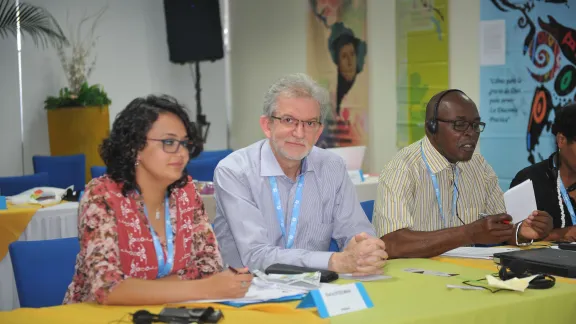
In the face of myriad social crises, Lutherans as a Christian community can still say âwe are not perfectâ but also offer space for dialogue and nurturing a sense of being together in communion,â said IECLB President , Rev. Dr Nestor Paulo Friedrich (middle). Photo: LWF/P. Cuyatti
PARAMARIBO, Suriname/GENEVA, 1 September 2016 (LWI) — What does God’s grace free Lutherans to do in an increasingly polarized world, where individuals and communities are seeking acceptance and meaning to life?
This was one of the questions among The Lutheran World Federation (LWF) member church delegates from Latin America and the Caribbean (LAC) and North America meeting this week in Suriname to prepare the regions’ input to discussions at LWF’s Twelfth Assembly in 2017.
In the face of myriad social crises, Lutherans as a Christian community can still say “we are not perfect” but also offer space for dialogue and nurturing a sense of being together in communion, said Rev. Dr Nestor Paulo Friedrich, president of Evangelical Church of the Lutheran Confession in Brazil (IECLB).
Delegates at the LWF Pre-Assemblies for LAC and North America discussed Friedrich’s and other presentations, highlighting the contextual and theological perspectives on the assembly theme “Liberated by God’s Grace,” and the sub-themes on why salvation, human beings and creation should not be for sale.
He reflected on IECLB’s response in a country dealing with serious threats on the Amazon because of illegal deforestation; the impact of climate change and environmental disasters; inequality and discrimination; and a proliferation of finance-driven churches promising miracle solutions to life’s problems.
“Such tension will always be with us. But we have to find a way by inviting the different groups, and have a real conversation with fundamental thought on how we will continue together. Sometimes we protect ourselves too much and don’t open up to others.”
What is the good news? What makes it news?
In her presentation, Rev. Dr Robin Steinke, Evangelical Lutheran Church in America (ELCA), emphasized the need for renewal of faith in the good news that Jesus had risen. She called for openness to listening to “God’s word and seeing ourselves in all our vulnerabilities, so that we might be free to hear, live and see what God is doing for the world through our witness as the church and as a communion.” She invited the participants to ponder the questions: “What is the good news? For whom is it good? What makes it news?”
Steinke said the good news of Christ’s resurrection and being liberated by God’s grace opens the way and freedom for repentance. She encouraged fellow participants to ask which were the “areas in our churches and communities that call for repentance and a change of heart.”
“Because Christ is risen, we are free to love the church,” she said, emphasizing this doesn’t mean an ideal church but the real church which might sometimes “fill us with dismay and rob us of hope.”
The church, Steinke added, was not a union or club of like-minded individuals. “We have a remarkable opportunity to be a communion of churches, where even in the midst of deep disagreements over things which really matter for the life of faith, we bear witness to God’s love for us by loving each other,” she added.
Such tension will always be with us. But we have to find a way by inviting the different groups, and have a real conversation with fundamental thought on how we will we continue together. Sometimes we protect ourselves too much and don’t open up to others."
A gift freely given for all
Discussing the sub-theme ‘Salvation - not for sale,’ Bishop Siegfried Sander, Lutheran Church in Chile, referred to Prof. Sarah Hinlicky Wilson’s article in the LWF Reformation 500 booklet on the same sub-theme. He called for self-criticism on why “our rich and liberating Lutheran theology hasn’t captured the hearts of those who follow the promising messages of the prosperity gospel.”
ELCA Presiding Bishop Elizabeth Eaton, also contributing to the salvation - not for sale sub-theme, discussed migration in the context of a globalized free-market economy, where goods and services can cross borders easily but not humans.
She said the critical link between the economy and this sub-theme is how it is understood according to Luther’s doctrine of the two kingdoms. In both worldly and heavenly realms, economic life is ruled by the moral principle “for all.” Thus, salvation is not something to be “purchased” or “consumed” by some, but a gift freely given for all. God intends for life to be both sufficient and abundant.”
Eaton said ELCA’s social teaching on economic activity emphasized the purpose of the economy (of God’s love) was to sustain life and not to create profits. “We [therefore] receive and engage the other as one of God’s children, whose life in the here and now, and throughout all of eternity, is of precious value,” she added.
The dignity of human beings
Contributing to the sub-theme on human beings, Rev. Katherine Altenburg, Evangelical Lutheran Church in Canada, talked about advocacy for the rights of migrant workers. “Isolation and visibility are the reality for many migrant workers. Few know their rights, a factor that increases the risk of abuse and exploitation. The dignity of human beings who are created in the image of God is not respected when they are just regarded as labor power, and not as people, she stressed."
Caretakers of ‘mother earth’
Rev. Emilio Aslla, Bolivian Evangelical Lutheran Church, said creation was God-given and the church had a responsibility to ensure it should not be for sale. An indigenous Aymara himself, he warned of the irreversible damage to the ozone layer because of human activity on biodiversity. By damaging the “beautiful creation” human beings had violated their role as caretakers of “mother earth.”
The outcome of discussions on the assembly theme and sub-themes in all LWF regions will contribute to the content of the Twelfth Assembly.


